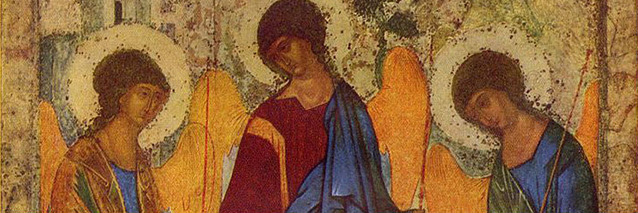"If you understand God as Trinity, there is no theological possibility of any hatred or vengeance in God."
Richard Rohr's Daily Meditation

"Trinity" (detail), c. 1410, Andrei Rublev. Tretyakov Gallery, Moscow.
"Fathers of the Eastern Church""Universal Restoration"
Thursday, 14 May 2015
(Feast of the Ascension of the Christ)
The shape of creation must somehow mirror and reveal the shape of the Creator. We must have a God at least as big as the universe, or else our view of God becomes irrelevant, constricted, more harmful than helpful. The Christian image of a torturous hell, and God as a petty tyrant, has not helped us to know, trust, or love God in any way. God ends up being less loving than most people we know. At this point in history most Christians have been preconditioned by a cheap story line of retributive justice, and no one told them about the much more profound Biblical notion of restorative justice. Those attracted to the common idea of hell operate out of a scarcity model, where there is not enough Divine Love to transform, awaken, and save. The dualistic mind is literally incapable of thinking any notion of infinity, limitlessness, or eternity.
The common view of hell is based not on any deep dive into Scripture but on Dante's Divine Comedy--great poetry, but not good theology. The Divine Comedy portrays a threatening, quid pro quo God, not an inviting, alluring, or loving God. The word "hell" is not mentioned in the first five books of the Bible. Paul and John never once use the word. And most of the Eastern fathers never believed in a literal hell, nor did many Western mystics. "Oh, I believe there is a hell," said Teresa of Avila to the Inquisitorial priests, but then is reported to have whispered to a nun nearby, "It's just that no one is there!"
Many Eastern fathers such as Origen, Clement of Alexandria, Gregory of Nyssa, Jerome, Peter Chrysologus, Maximus the Confessor, and Gregory of Nazianzus taught some form of apocatastasis or "universal restoration" (Acts3:21). Origen writes: "An end or consummation is clearly an indication that things are perfected and consummated. . . . The end of the world and the consummation will come when every soul shall be visited with the penalties due for its sins. This time, when everyone shall pay what he owes, is known to God alone. We believe, however, that the goodness of God through Christ will restore his entire creation to one end, even his enemies being conquered and subdued."[1]
Morwenna Ludlow describes Gregory of Nyssa's two arguments for universal salvation as: "a fundamental belief in the impermanence of evil in the face of God's love and a conviction that God's plan for humanity is intended to be fulfilled in every single human being. These beliefs are identified with 1 Corinthians 15:28 and Genesis 1:26 in particular, but are derived from what Gregory sees as the direction of Scripture as a whole."[2]
You can't be more loving than God; it's not possible. If you understand God as Trinity--the fountain fullness of outflowing love, relationship itself--there is no theological possibility of any hatred or vengeance in God. Divinity, which is revealed as Love Itself, will always eventually win. God does not lose (John 6:37-39). We are all saved totally by mercy. God fills in all the gaps. Reincarnation or a "geographic" hell or purgatory are unnecessary (though this does not mean there is no place or time for change or growth).
Knowing this ahead of time gives you courage, so you don't need to live out of fear, but from an endlessly available love. To the degree you have experienced intimacy with God, you won't be afraid of death because you're experiencing the first tastes and promises of heaven already now. Love, grace, and mercy are given undeservedly here, so why would they not be given later too? Do we have two different gods? One who forgives and teaches with a 70 x 7 policy before death, but then counts and punishes every jot and tittle afterward? It just does not work! As Jesus puts it, "God is not the God of the dead, but of the living--for to him everyone is alive" (Luke20:38). In other words, growth, change, and opportunity never cease.[3]
Gateway to Silence: We are one.
Center for Action and Contemplation
cac.org
Center for Action and Contemplation
1823 Five Points Road SW (physical)
PO Box 12464 (mailing)
Albuquerque, New Mexico 87195 United States
___________________________
___________________________





No comments:
Post a Comment